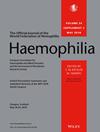Differences and similarities in patient-reported outcomes among men and women with haemophilia
Abstract
Introduction
Both men and women can be diagnosed with haemophilia and the experience with haemophilia may be different between men and women.
Aim
This study aimed to compare patient-reported outcomes in men versus women with haemophilia.
Methods
This cross-sectional study is a post-hoc analysis of data collected as part of the Haemophilia-related Distress Questionnaire validation study. Adults aged ≥18 years with haemophilia A or B were recruited from one of two haemophilia treatment centres between July 2017 and December 2019. Outcomes included quality of life, measures of mental and physical health, and overall health. Unadjusted and multivariable linear regression models were used to examine potential mediators of sex-based differences in outcomes.
Results
Of the 139 study participants included (21 women, 118 men), the mean age was 36.9 years and most (89.2%) had haemophilia A. Approximately 85.7% and 26.3% of women and men had mild haemophilia, respectively. PHQ-9 depression and PROMIS-29 Profile anxiety and fatigue scores were significantly higher in women than men in unadjusted and adjusted analyses. There were no statistically significant differences in other outcomes.
Conclusions
Women with haemophilia are more likely to experience depression, anxiety, and fatigue than men with haemophilia. This study highlights the need for mental health services to be integrated into the care of women with haemophilia. Future research is needed to understand whether women with haemophilia are more or less likely to experience depression, anxiety, and fatigue than women without haemophilia as well as determine the impact of reduced mental health on clinical outcomes.

 求助内容:
求助内容: 应助结果提醒方式:
应助结果提醒方式:


